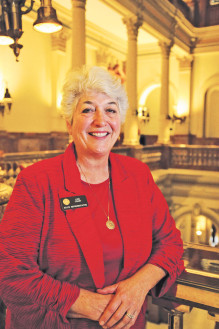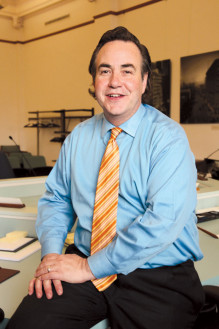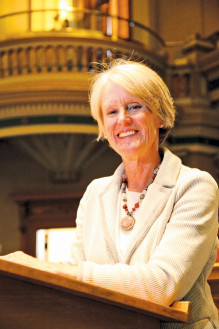To better acquaint our readers with their legislators, the Front Porch asked our area’s state senators and representatives to share their knowledge and views on some of the big issues this year. Colorado is the only state where citizens, rather than legislators, vote on taxes. Regardless of your views on TABOR, taxes or politics, we believe the information here will help you understand the complexity of setting state policies and providing state services without setting taxes. We hope this will help you make an informed decision when you vote.![]()
TABOR and TAX POLICY

State Rep. Lois Court (D) represents District 6, which includes all of Lowry, E. Montclair, Montclair and Mayfair.
Rep. Lois Court talks about the difficulty of serving in the only state in the country where the people elected to govern don’t have the power to tax. Under the Taxpayer Bill of Rights (TABOR), passed in 1992, all new taxes must be approved by the voters.
Further, TABOR restricts the amount of taxes the state can keep based on a formula that includes population, prior revenue and inflation. Even though the economy is doing well now, the state’s revenue can only increase incrementally based on prior levels.
Court (a community college civics professor) pulls out a little (3” x 5”), 38-page red booklet that is a copy of the U.S. Constitution and cites article 4, section 4, which guarantees a republican (representative) form of government. She believes TABOR violates the constitution by taking away the right of our elected officials to provide services, “because if you can’t tax, you can’t provide services.” Court points out that the Boston Tea Party in 1773 was about “taxation without representation,” and calls TABOR “representation without taxation.” Sen. Pat Steadman says of TABOR’s impact, “People’s vote for an elected representative doesn’t really elect people that have the power that most voters think their legislators have.”
Is TABOR unconstitutional?
Based on this denial of the power to tax, a group of current and former elected representatives, including Lois Court, have filed a lawsuit, Kerr v. Hickenlooper, that TABOR is unconstitutional. As this article was being written, the plaintiffs were awaiting a decision on whether the U.S. Supreme Court would take this case. The 10th Circuit Court of Appeals determined the plaintiffs have standing to bring the case and it could proceed and be tried in federal court. That ruling is being appealed to the U.S. Supreme Court. If they take the case, it would be to consider the lower court’s decision on standing to sue. The actual merits of whether TABOR violates the U.S. Constitution aren’t part of this step. If the Supreme Court upholds the prior ruling or they don’t take the case, the lawsuit will proceed and TABOR will go to trial in federal district court.
But for now, TABOR stands and our legislators are looking for ways to fund the needs of the state without access to all the tax revenue being created by a booming economy.
TABOR is an extremely complicated amendment that few people (including some legislators) fully understand. But Rep. Court points out that there are three main points that voters should know about TABOR. 1) All taxes must be determined by a vote of the people. 2) If revenue exceeds the TABOR limits it must be refunded. 3) The state can only keep the revenue above the TABOR limit if there is a general vote in favor of keeping it.
Economic Forecast: The 3-5 Year Impact of TABOR
“Do we leave this alone long term and if we do, what’s going to happen?” asks Court. “The economic forecasts estimate that within three to five years, we will have money in the general fund for only K-12, corrections and Medicaid because of all the money we’ll be giving back. That is zero for higher education, zero out of the general fund for transportation, zero for social services, zero for disabled people. That is the economic forecast if status quo is maintained. We’ll fall off this cliff. It is because of the crashing together of the factors in the constitution like Amendment 23 (school funding), TABOR, existing expenditures, existing tax policies of many kinds. This is not absolute, but the estimate is that’s where we’re headed.”
The legislature is discussing what future actions may be necessary to address the projected impact of TABOR on the state’s general fund, but it appears unlikely that any significant change to TABOR will be proposed this session.
However there is an imminent TABOR-related issue that, one way or another, will get addressed in 2015.
Another vote coming on marijuana taxes
There is some little known or understood language in TABOR that affects the first year of a new tax in a different way than all later years. Because of that clause, the currently estimated (and likely to increase) $58.7 million in marijuana taxes collected during the first full fiscal year would have to be returned unless voters specifically approve letting the state keep that tax revenue.
Sen. Steadman is working on a ballot measure that he and other legislators believe reflects the voters’ intentions at the time the marijuana tax was approved—and trying to prevent those intentions from being sidelined by the complicated language of TABOR.

State Senator Pat Steadman (D) represents District 3, which includes Montclair, Mayfair, Hale and Lowry.
Steadman says, “I think voters have made their wishes on this very clear. They passed Amendment 64 (legalizing personal use of marijuana). They approved Proposition AA (taxes on retail sales of marijuana). We’re going back to them and saying, ‘TABOR has some technicalities that are tripping us up this first year. We need you to vote again that you really meant it when you said you wanted it taxed and you wanted the taxes to be spent on issues arising because of marijuana legalization.”
Steadman further explains that proposition AA (on marijuana taxes) contained a provision that marijuana tax money, after the first year, was exempt from TABOR limits. “No matter how much marijuana taxes grow, they will never contribute to TABOR refunds because the voters gave the approval, in all years after the first year, for all marijuana revenues to be retained and spent.”
The November ballot measure will ask voters if they want the first year’s marijuana tax revenue to be kept and spent by the state—and it will say how the legislature proposes to spend it. If it does not pass, the money will be refunded and the mechanism for refunds will be determined by the legislature.
The final wording of the ballot measure is still under discussion, but Steadman says he personally thinks $40 million (the number voters saw when voting for Amendment 64) should be put into the school construction fund. The balance, some $20 million, should be allocated similar to how marijuana taxes were allocated last year: law enforcement and regulatory enforcement, youth education and prevention efforts, and substance abuse treatment services.
Setting tax policy without setting taxes
Steadman and Court talked about how the legislature does set tax policy for Colorado, even without the ability to set taxes. The legislature makes decisions about what will not be taxed—what amount of potential tax revenue the state will forego to encourage certain outcomes. “We have over $2 billion worth of tax exemptions and tax credits on the books,” says Court. “Are they all valuable? Are they all giving the citizens something in return for revenue not collected?”
If tax exemptions and tax credits were to be done on a large enough scale it could prevent the state from reaching the TABOR limits. Steadman raises the question, “Should we be doing something different to not exceed the TABOR limits?”
One area that would be significantly impacted by exceeding the TABOR limits is transportation funding. “In any year in which we owe a TABOR refund that’s less than 3% of total general fund appropriations, scheduled transfers to the highway construction fund are reduced by 50%. If the TABOR refund is more than 3% of general fund appropriations, then those highway fund transfers are eliminated,” says Steadman.
But he points out that polls have consistently shown that voters would choose refunds over highway funding. “Supporters of increased highway funding are trying to figure out what can be done in terms of tax policy and other ways of dealing with TABOR issues that don’t go to voters but that eliminate the refunds and allow them to get the highway funds.”
“Should we have tax credits benefitting low income and middle income families? Should we have tax credits for economic development that look more like corporate welfare?” asks Steadman.
He says legislators are “surveying the landscape to determine what options might be viable…Republicans say they want to pay TABOR refunds. Wiggling our way out of refunds by doing special interest tax credits probably isn’t going to be the magic ticket…There are many options and it’s really not clear which path forward we’re going to take.”
JUSTICE SYSTEM
Our legislators are participating in conversations similar to those now happening all over the country in the area of police reform and fairness in the justice system. Another justice system issue is whether Colorado should continue its policy of keeping DUIs a misdemeanor after multiple offenses—or if multiple DUIs should be a felony? A third issue is keeping minors out of the justice system.
Colorado lacks the data needed to identify racial disparities

State Representative Angela Williams (D) represents District 7, which includes all but two Stapleton precincts and Park Hill from Quebec to Monaco (south to Montview).
“First we have to admit what has occurred here in Colorado—then how do we address that?” asks Rep. Angela Williams.
But Williams, Rep. Beth McCann and Senator Mike Johnston acknowledge the difficulty of that task because there is currently no data available to determine how much racial profiling is happening and where.
There is no data by race or ethnicity on police stops and arrests or who gets charged, convicted or paroled. Nor is there ethnicity data for officers or victims when police shoot or get shot. Johnston says, “We can’t get easy data on this in Colorado to even know if there is a problem.”
All three legislators agree it’s within the purview of the state to require municipalities to track such data, but McCann points out, “The issue is always financing because it would require staff to collect data at the local level.” She adds that municipalities ask, “Are you going to fund us if we have to do this at a local level?”
Johnston says, together with civil rights leaders and community activists, he and other legislators are looking at a proposal to evaluate what the racial disparities are.
Williams says although we have a statute that prohibits racial profiling by police officers, “It’s pretty vague. I believe it can be improved and be more directive on what police can and can’t do.”
Police training and community programs
Williams believes the state could mandate additional police training programs that are proactive rather than reactive, that would improve the relationship between the police and the communities they serve. She points out that many other fields require continuing training to maintain certification.

State Rep. Beth McCann (D) represents District 8, which includes all of Park Hill from Locust to Colorado Blvd., Hale, East Colfax, and two precincts in Stapleton just north of Montview and east of Central Park Blvd.
McCann agrees that additional training for police would be beneficial and cites the crisis intervention training already being used by some police forces that teaches officers how to de-escalate a tense situation.
Johnston says he’s working on creating an incentive grant program for jurisdictions that want to do more proactive community based policing as a way to build an established trust.
Making multiple DUIs a felony
Senator Johnston and Rep. McCann are both working with a Republican counterpart on a bipartisan bill that would make multiple DUIs a felony rather than just multiple misdemeanors. The proposed harsher charge is combined with more support and intervention to prevent future offenses. Johnston says Colorado is one of only two states that doesn’t have a higher penalty after multiple DUIs— “You can get 6, 7, 10, 15 DUIs and never face a felony charge and never face any serious jail time.”
This bill will say the third DUI in 7 years can still be a misdemeanor if there are no aggravating factors, like an accident or very high blood alcohol, which would make it a felony. And if you get four over a lifetime, you would be subject to a felony.
One of the reasons a similar bill didn’t pass last year was cost. More felony charges would mean more people go to jail. To help people not drive drunk and therefore not get a felony and go to jail, this bill, after two DUIs, would require that people get an “interlock” breathilizer device on their car. The offender would pay $40/month for the device and must keep it for three years.
McCann says judges have limited penalties for misdemeanors, even when there are multiple ones. “Judges would like a broader array of options. I hope it will act as a deterrent if someone knows that if they do it again, they’re going to have a felony record.”
“We’re not simply saying throw the book at them,” says Johnston, “nor are we saying let people drive drunk as long as they want. We’re saying let’s be mindful of how we can be both firm and support what science tells us about interventions and treatments to find a way to reduce people’s likelihood of using alcohol and driving.”

State Senator Mike Johnston (D) represents District 33, which includes Stapleton and Park Hill.
Keeping children out of the justice system
Rep. McCann is proposing a bill that, after a low level offense by a minor, would give law enforcement the ability to form a contract with the child and the parents. The contract would require things like staying in school, not getting into additional trouble, and maybe doing community service. But they are never actually charged with a crime, so if they complete the contract there is nothing on their record. Currently in some jursidictions (including Denver), says McCann, there has to be a charge before a kid can be put into diverson. “I’m very hopeful this will help keep many of our young people out of the criminal justice system at an earlier stage.”
INNOVATIVE FUNDING
Senator Johnston says he’s really excited about what he calls the Pay for Success Program. “It’s an innovative way to try to fund public programs by only paying for those programs once they achieve certain outcomes.”
“An example is recidivism rates for those coming out of prison. Now 50% of all prisoners when released will be back in jail within 3 years. The average sentence on a new conviction is around 5 years at around $40k a year. That costs about $200,000 for one of every two inmates we release. We know there are highly successful programs where you spend $10-$15,000 to get someone work training and a job share—programs where the state pays part of the salary for the first 6 months to encourage a company to hire. You can invest $15,000 and save over $100,000 of future corrections spending.” Johnston says this bill would allow local governments and nonprofit providers to enter into contracts that would only obligate the state to pay for services if the contractor delivered on the outcome. The program would have to find investors, who would be repaid with the money the state saved.
Johnston says Utah has already done this with an early childhood education program.
ECONOMIC DEVELOPMENT
Rep. Angela Williams says workforce development (putting people to work) and encouraging business growth are areas that both Republicans and Democrats are focused on this year.
Workforce development
She says, “there is a need for programs that would train workers who lost jobs and their current skills don’t get them a job that pays a livable wage.” While supporting educational programs that prepare students for college, Williams also thinks we have to create options for those who want a skill that’s not part of a four-year degree program. “We have to look at how we train our young people and give them hands on training and certificate programs that allow them to get into the workforce sooner.”
Business growth
Williams says last year bills were passed to encourage aerospace, advanced industry, and incubators for technology in Colorado. She adds the energy industry to that list this year. “The energy industry is growing and we’re going to be putting a lot of effort there—not just training but promoting energy and energy businesses and the training of people who want to be in those industries.”
Condo development
Condo development has slowed in Colorado. “There’s an effort starting in the senate now to see if we can come to agreement to address these issues around construction defects,” says Williams. Developers say they there is too much risk under the existing law that allows them to be sued by individuals rather than groups of owners or condo associations.
Personal property tax exemption
Williams helped pass a bill last year that raised the business personal property tax exemption from $7,000 to $15,000. She hopes to get it raised further this year.
RENEWABLE ENERGY
Rep. McCann says she would like to make Colorado the renewable energy capital of the country. She is sponsoring a bill that would benefit to renewable energy companies that locate in Enterprise Zones. Companies in Enterprise Zones get a 25% tax credit on certain expenditures. This bill would allow renewable energy companies to use 80% of their tax credit as cash, up to $750,000 per year per company. The companies would have to commit to reinvesting the money in Colorado.
EDUCATIONAL TESTING
Senator Mike Johnston says legislators are looking for common sense ways to try to reduce burden of testing but be sure parents and community have good information about how kids are doing and schools are doing. He thinks there will be a proposal to: reduce some testing at the high school level, particularly in social studies and for 12th graders; reduce and streamline testing from kindergarten to 3rd grade; and provide better resources and support, especially technology, for testing in grades 3-8.
“We’ll work with districts to determine what local tests are duplicated by state ones and remove the local ones. National and local studies have found that about 70% of the total testing burden is coming from local districts.
“We’re going to try to make clear for parents what the test is, what it’s purpose is and who’s requiring it.”



0 Comments